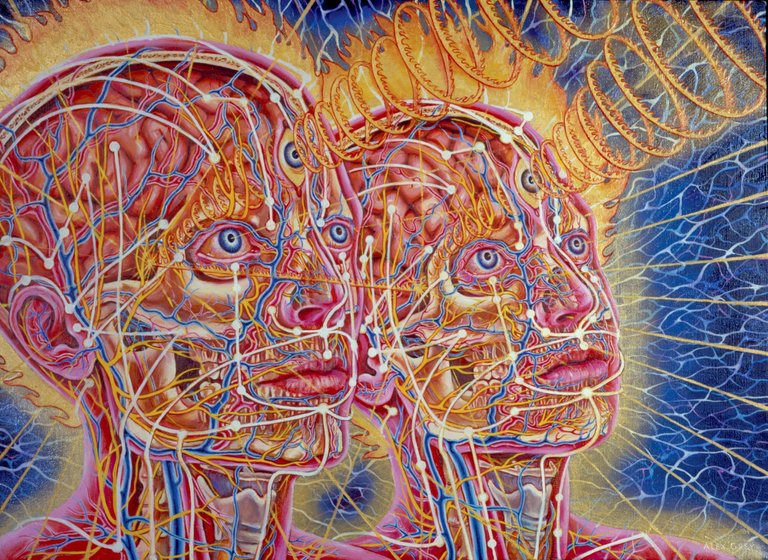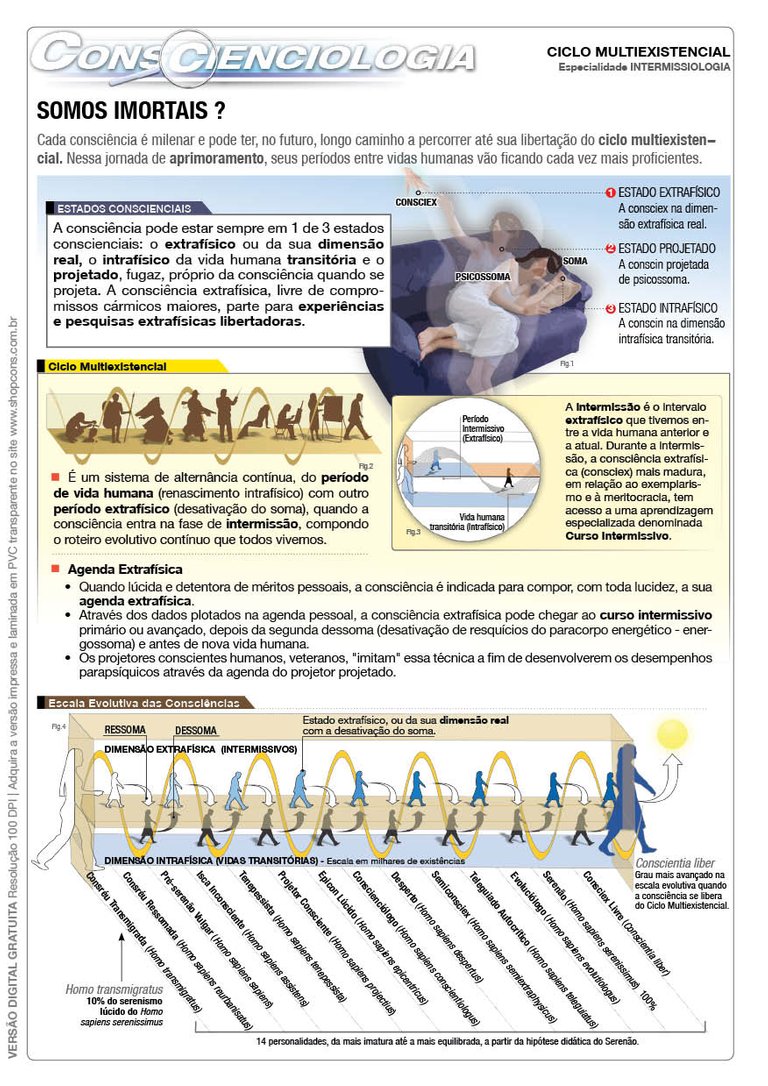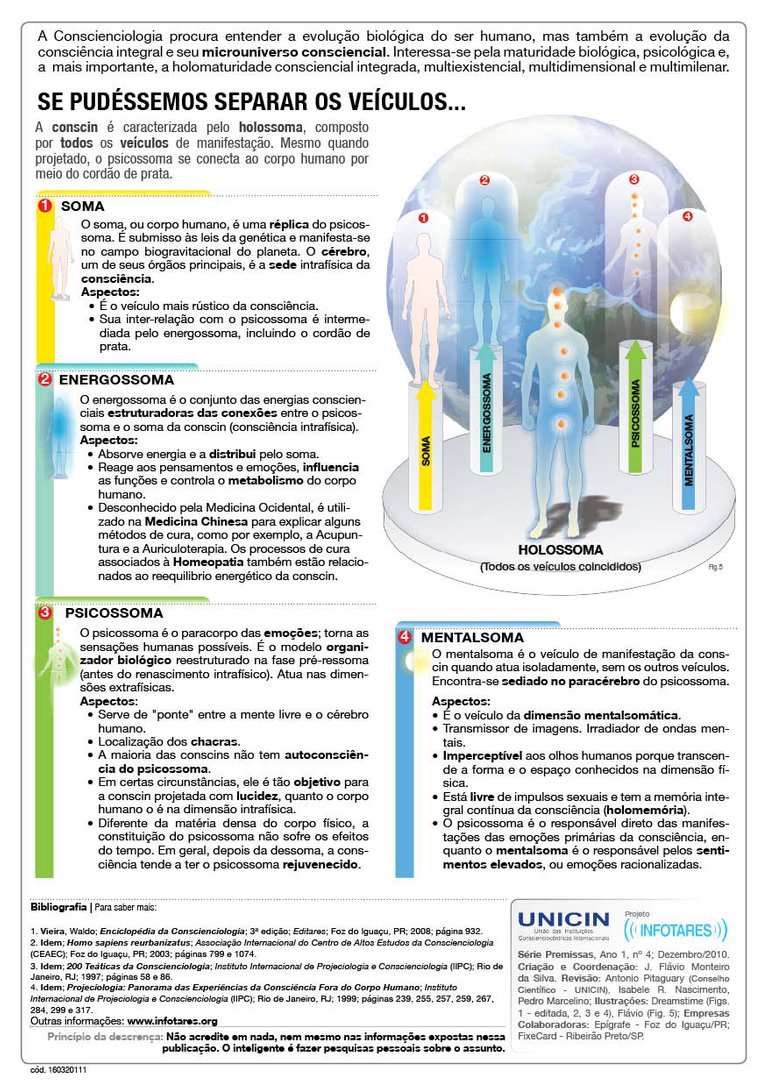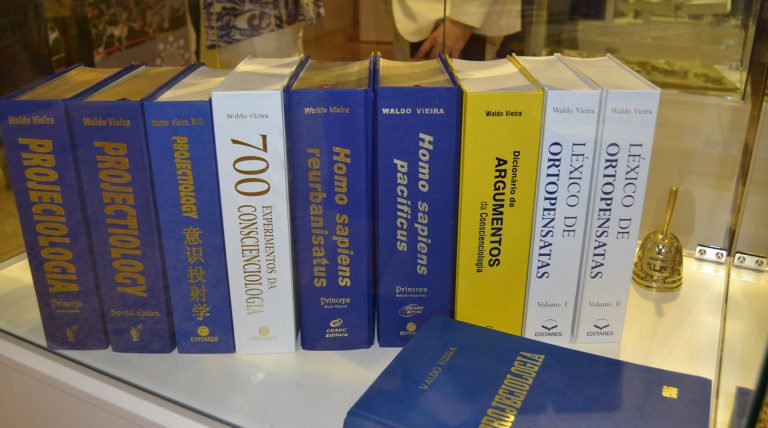It's been a good few years since I stopped studying Conscientiology firmly, and now, in an effort that is not very simple, I am little by little opening space in my mental agenda to return to these studies. At the time I remember proposing to myself to take a break from everything I had been studying in this sense so that I could freely and independently investigate other reconditions of reality, but as expected, self-study has many chances of failing due to the constant flow of routine and the unforeseen events of everyday life, so what I called the "independent self-research" phase ended up becoming just a long vacation from my deepening study of consciousness. But today, revisiting the terms, books, and videos of conscientiology, I realize that I am still familiar with much of the material (although some sore points are a knot in this harmonic line and I will need to go into them with more care and attention). You may have no idea what I am talking about, and it is exactly for you that I am writing this content. Let's go.

*Alex Gray - New Man, New Woman - 1984
What is Conscientiology?
The very term "mother" already comes as a neologism, since this word was not officially considered a term until recently, but the great beauty of our language (or human languages, rather) is the construction of new names to explain things that need new words. The proposer of conscientiology, Waldo Vieira, always stated that a new science needs new words, mainly to disentangle itself from the cobwebs and greasy ties of many less aseptic strands that have studied this type of content over the past thousands of years. Conscientiology is the science that studies the consciousness. But make no mistake, we are not talking about the consciousness studied in psychology, which dwells only on the reflections of the puddles of our mind, but rather a broad study of the entire vast canyon that assembles our "soul" with its winding footpaths, cliffs and hills, trails, shortcuts, fast lanes and peaks. But above all this, Conscientiology studies not only our "mental body" (called the Mentalsoma), but all the vehicles of our terrestrial existence, which consist of the "Holosoma. The need to separate these bodies is due exactly to the complexity of the human being and because many of the situations we experience are directly linked to one of these bodies. They are The Soma (the Soma (the vehicle in itself, our action on earth), The Energosoma (The Energosoma (the body, as if it were the "battery" of the vehicle), The Psychosoma (the body of emotions, the layer that involves all the emotional psychological layers, and involvement with the world) and finally the Mentalsoma which is the body of pure consciousness, free from the viscosities of the psychological attachment to matter. Each one of these vehicles could be infinite content for future books to be written by those interested in delving deeper. We, as average humans, who are not very dedicated to self-study at deep levels, end up acting and thinking only with the physical body (the soma) and the emotional body (the psychosoma). In a proper moment, I will make a more intense and detailed analysis about each one of these vehicles of manifestation in order to open the range in a worthy manner. Since Conscientiology studies these vehicles of manifestation, then automatically it also studies everything that involves all these bodies, from the basic minimum process about physical health, hygiene and habits of the material body to the maximum possible expansion of consciousness with cognitive amplification that extrapolates the limits of the physical brain in technical and complex subjects such as the projection of the mentalsoma, connection with the memory files of all previous lives, access to spheres of knowledge and absorption of knowledge in blocks and so on. And since I am talking about topics that are difficult to digest for many let's go to a point that is possibly a stumbling block for some: the hypothesis of successive lives.

Source
The hypothesis of the seriality of lives, or Seriexis (the seriality of existence) is finally a study for a subject that has spent millennia trapped in dusty archives of doctrines and religions that framed it as one of the mysteries and bases barely understandable, giving the living an experience of a subject not approachable or incapable of being discussed in complexity. The idea of Conscientiology is exactly to dismember all possible layers and suppositions, evidences or lack of them, and all facets of the theme until exhausting it, with a criticality and logic without diving into flourishes and without allowing the theme to be framed with religious or doctrinal fantasies, taking the hypothesis out of the field of religion once and for all and putting it on the laboratory table to be studied. Like many of the themes addressed by conscientiology, Seriexis (or seriality of existence) is a complex and still very little understood subject. The difficulty of being able to outwardly measure another's experience makes this (like so many other subjects) dependent on self-evaluation and self-criticism and needs to be (like all other subjects of study) analyzed, dissected, catalogued, and experienced, which brings us to one of the cornerstones of the structure of this new science.

Source
The Disbelief Principle
The Consciential Paradigm has as its fundamental basis the "Principle of Disbelief" which considers it fundamental that the experimenter/guinea-pig/researcher has total lucidity of his acts and of his search and that he is never based solely on the written and explained content, but that he has personal experiences that can prove such hypotheses, from simple observations in relation to energetic and extraphysical sensations to great perceptions and expansion of consciousness induced by suggested techniques, or even profound extrapolations such as an out-of-body projection assisted by helpers or visits to extraphysical colonies, everything should be analyzed and criticized coldly, always based on the lucid process of discarding first the most logical and basic hypotheses until it can be verified that in fact a certain experience was experienced and fits into what addresses a certain facet of this science. Therefore, the best method to verify certain perceptions and assumptions of a science such as this is by having one's own experiences that prove it. Many of the scholars of conscientiology dive into it given the inherent connection with the "Top Relative Truths" that are presented, that is, the most finely tuned truths we have so far, and the idea is that the moment certain evidence demonstrates that what was held as "truth" in conscientiology was wrong, the scholar should move on and always seek what is in fact more finely tuned and real, proven and evidenced.

The most important works ever written by the proposer of conscientiology, Waldo Vieira
Source
Well, the topic is vast and deserves a dive of years of content here, I have knowledge of more than five years studying this paradigm and I intend to bring more and more concepts and worldviews here, but each thing in its own time, I am in full transition of perception of reality. I am posting this initially from #ProofofBrain for lack of a more suitable place, but the openness present here fits very well for this content. I thank you for your attention and reading.
Useful links
Conscientiopedia
Conscientiology.org
CEAEC
Tertuliarium
ICEGE

Português
Passaram-se alguns bons anos desde que parei de estudar com firmeza a Conscienciologia, e agora em um esforço que não é muito simples estou pouco a pouco abrindo espaço em minha agenda mental para voltar a esses estudos. Na época lembro-me de ter proposto a mim mesmo dar um tempo a tudo que eu vinha estudando nesse sentido para poder vasculhar outros reconditos da realidade de forma livre e independente, mas tal qual era esperado, o estudo auto-didata tem muitas chances de falhar devido ao fluxo constante da rotina e dos imprevistos do dia-a-dia, de forma que o que eu chamei de fase de "auto pesquisa independente" acabou por torna-se apenas uma longa férias do meu aprofundamento no estudo da consciência. Mas hoje, revisitando os termos, os livros e os videos da Conscienciologia eu percebo que ainda familiarizo com boa parte do material (ainda que alguns pontos nevrálgicos sejam um nó nessa linha harmônica e precisarei debruçar-me neles com mais cuidado e atenção). Talvez você nem faça ideia do que estou falando e é exatamente para você que estou escrevendo esse conteúdo. Vamos lá.

Alex Gray - New Man, New Woman - 1984
O que é a Conscienciologia?
O próprio termo mãe já vem como um neologismo, dado que esta palavra até pouco tempo não era de fato oficialmente um termo considerado, mas a grande beleza da nossa lingua (ou das línguas humanas, melhor dizendo) é a construção de novos nomes para explicar coisas que precisam de novas palavras. O propositor da Conscienciologia Waldo Vieira sempre afirmava que uma nova ciência precisa de novas palavras, principalmente para desvincular-se das teias de aranha e amarras sebosas de muitas vertentes menos assépticas que estudaram nos últimos milhares de anos esse tipo de conteúdo. A Conscienciologia é a ciência que estuda a consciência. Mas não se engane, não estamos falando da consciência estudada na psicologia que detem-se apenas nos reflexos das poças de água da nossa mente, e sim num estudo amplo de todo o vasto canyon que monta nossa "alma" com suas sinuosas alamedas, falésias e colinas, carreiros, atalhos, vias-rápidas e picos. Mas acima de tudo isso, a Conscienciologia estuda não apenas o nosso "corpo mental" (chamado de Mentalsoma), mas sim todos os veículos de nossa existência terrestre, que consistem o "Holossoma". A necessidade de separar estes corpos é devido exatamente a complexidade do ser humano e por que muitas das situações que vivenciamos está ligada diretamente a um destes corpos. São eles: O Soma (o veículo em si, nosso instrumento de ação na terra), O Energossoma (O corpo energético, como se fosse a "bateria" do nosso veículo), O Psicossoma (o corpo das emoções, a camada que envolve todas as camadas psicológicas emocionais, e envolvimento com o mundo) e por fim o Mentalsoma que é o corpo da consciência pura, isento das viscosidades do atrelamento psicológico com a matéria. Cada um desses veículos pode ser conteúdo infinito para futuros livros a serem escritos por aquele que se interessar em aprofundar. Nós como humanos médios pouco dedicados ao auto-estudo em níveis profundos acaba por agindo e pensando apenas com o corpo físico (o soma) e com o corpo emocional (o psicossoma). Em momento propício irei fazer uma análise mais intensa e detalhada sobre cada um desses veículos de manifestação para abrir o leque de forma digna. Dado então que a Conscienciologia estuda estes veículos de manifestação, então automaticamente estuda também tudo que envolve todos estes corpos, desde o processo mínimo básico sobre saúde física, higiene e hábitos do corpo material até a expansão máxima possível da consciência com a ampliação cognitiva que extrapola limites do cérebro físico em temas técnicos e complexos como a projeção do mentalsoma, conexão com os arquivos de memória de todas as vidas anteriores, acesso a esferas de conhecimento e absorção de conhecimento em blocos e assim por diante. E já que estou falando de temas de difícil digestão para muitos vamos a um ponto que é possivelmente um atravancador para alguns: a hipótese das vidas sucessivas.

Source
A hipótese da serialidade das vidas, ou Seriexis (a serialidade da existência) é enfim um estudo para tema que passou milênios presos em arquivos poeirentos de doutrinas e religiões que a emolduravam como um dos mistérios e bases pouco compreensíveis, dando ao vivente uma experiência de tema não abordável ou incapaz de ser discutido em complexidade. A ideia da Conscienciologia é exatamente de desmembrar todas as possíveis camadas e suposições, evidências ou falta delas e todas as facetas do tema até esgotá-lo, com uma criticidade e lógica sem mergulhar em floreios e sem permitir emoldurar o tema com fantasias religiosas ou doutrinárias, tirar de vez a hipótese do campo da religião e colocá-lo na mesa de laboratório para ser estudada. Tal como muitos dos temas abordados pela Conscienciologia, a Seriexis (ou serialidade da existência) é um tema complexo e ainda muito pouco compreendido. A dificuldade de poder mensurar exteriormente a experiência de outrem torna este (como tantos outros temas) dependente da auto-avaliação e auto-crítica e precisa ser (tal como todos os outros temas de estudo) analisado, dissecado, catalogado e experienciado, o que nos leva para uma das pedras base da estrutura dessa nova ciência.

Source
O Princípio da Descrença
O Paradigma Consciencial tem como base fundamental o "Princípio da Descrença" que considera fundamental que o experimentador/cobaia/pesquisador tenha total lucidez de seus atos e de sua busca e que jamais baseie-se unicamente no conteúdo escrito e explanado, mas sim que tenha vivências pessoais que possam comprovar tais hipóteses, desde simples constatações em relação a sensações energéticas e extrafísicas até grandes percepções e expansão da consciência induzidas por técnicas sugeridas, ou mesmo em extrapolações profundas como uma projeção fora do corpo assistida por amparadores ou visita a colônias extrafísicas, tudo deve ser analisado e criticado friamente, sempre baseado no processo lúcido de descarte primeiramente das hipóteses mais lógicas e básicas até que se possa constatar que de fato determinada vivência foi experimentada e cabe no que aborda determinada faceta desta ciência. Então, o melhor método de verificar determinadas percepções e suposições de uma ciência como essa é tendo as próprias experiências que comprovem-na. Muitos dos estudiosos da Conscienciologia mergulham nela dado a inerente conexão com as "Verdades Relativas de Ponta" que são apresentadas, ou seja, as verdades mais afinadas que temos até então, e a ideia é que, no momento que determinada evidência demonstrar que o que se tinha como "verdade" na conscienciologia estava errada, o estudioso deve seguir em frente e buscar sempre o que de fato é mais afinado e real, comprovado e evidenciado.

Os trabalhos mais importantes já escritos pelo propositor da Conscienciologia, Waldo Vieira
Source
Bom, o tema é vasto e merece um mergulho de anos de conteúdo aqui, tenho conhecimento de mais de cinco anos estudando esse paradigma e pretendo trazer mais e mais conceitos e visões de mundo pra cá, mas cada coisa a seu tempo, estou em plena transição de percepção da realidade. Estou postando inicialmente pelo #ProofofBrain por falta de um local mais adequado, mas a abertura presente aqui cai muito bem para esse conteúdo. Agradeço a atenção e leitura.
Link úteis
Conscienciopédia
Conscienciologia.org
CEAEC
Tertuliarium
ICEGE



